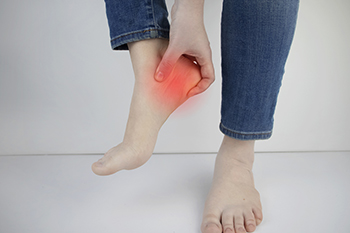Items filtered by date: August 2021
Reminder: When Was the Last Time...?
What Are Common Causes of Plantar Fasciitis?
 The plantar fascia is a tendon located on the bottom of the foot. It is known for being strong and inflexible, and supports the arch of the foot. This tendon connects the heel to the toes, and a healthy plantar fascia plays a significant role in completing daily activities without pain. An imbalance in the style of walking can alter the foot mechanics, and the plantar fascia may become damaged. This can lead to inflammation of this tendon, which in turn may become plantar fasciitis. Some of the causes that are associated with this ailment can include obesity, and standing on hard surfaces for the majority of the day. Additionally, a sudden increase in speed and intensity during running may lead to gradual development of plantar fasciitis. This condition can cause severe pain and discomfort, and it is suggested that you are under the care of a podiatrist who can properly diagnose and treat plantar fasciitis.
The plantar fascia is a tendon located on the bottom of the foot. It is known for being strong and inflexible, and supports the arch of the foot. This tendon connects the heel to the toes, and a healthy plantar fascia plays a significant role in completing daily activities without pain. An imbalance in the style of walking can alter the foot mechanics, and the plantar fascia may become damaged. This can lead to inflammation of this tendon, which in turn may become plantar fasciitis. Some of the causes that are associated with this ailment can include obesity, and standing on hard surfaces for the majority of the day. Additionally, a sudden increase in speed and intensity during running may lead to gradual development of plantar fasciitis. This condition can cause severe pain and discomfort, and it is suggested that you are under the care of a podiatrist who can properly diagnose and treat plantar fasciitis.
Plantar fasciitis is a common foot condition that is often caused by a strain injury. If you are experiencing heel pain or symptoms of plantar fasciitis, contact Jon McCreary, DPM from Fort Worth Podiatry. Our doctor can provide the care you need to keep you pain-free and on your feet.
What Is Plantar Fasciitis?
Plantar fasciitis is one of the most common causes of heel pain. The plantar fascia is a ligament that connects your heel to the front of your foot. When this ligament becomes inflamed, plantar fasciitis is the result. If you have plantar fasciitis you will have a stabbing pain that usually occurs with your first steps in the morning. As the day progresses and you walk around more, this pain will start to disappear, but it will return after long periods of standing or sitting.
What Causes Plantar Fasciitis?
- Excessive running
- Having high arches in your feet
- Other foot issues such as flat feet
- Pregnancy (due to the sudden weight gain)
- Being on your feet very often
There are some risk factors that may make you more likely to develop plantar fasciitis compared to others. The condition most commonly affects adults between the ages of 40 and 60. It also tends to affect people who are obese because the extra pounds result in extra stress being placed on the plantar fascia.
Prevention
- Take good care of your feet – Wear shoes that have good arch support and heel cushioning.
- Maintain a healthy weight
- If you are a runner, alternate running with other sports that won’t cause heel pain
There are a variety of treatment options available for plantar fasciitis along with the pain that accompanies it. Additionally, physical therapy is a very important component in the treatment process. It is important that you meet with your podiatrist to determine which treatment option is best for you.
If you have any questions, please feel free to contact our office located in Fort Worth, TX . We offer the newest diagnostic and treatment technologies for all your foot care needs.
The Many Causes of Heel Pain
 Heel pain can have a variety of causes, but the most common cause of it is plantar fasciitis. This occurs when the long band of tissue on the sole of the foot becomes inflamed. Women late in their pregnancy and people who waitress or work on their feet all day may be more at risk for developing this type of heel pain. Other causes of heel pain can include: a small crack in the heel bone, compressed nerves, worn down heel pads, nerve damage, thickened tissue surrounding a nerve, inflammation of the tendon that connects the heel bone with the calf muscles, plantar warts, and abnormalities in the bone which can causes inflammation of the bursa sac. There may also be injury to the tunnel between the heel and talus bones known as Sinus Tarsi Syndrome. If you are struggling with any type of pain in your heel it is suggested that you schedule an appointment with a podiatrist for an accurate diagnosis and proper treatment.
Heel pain can have a variety of causes, but the most common cause of it is plantar fasciitis. This occurs when the long band of tissue on the sole of the foot becomes inflamed. Women late in their pregnancy and people who waitress or work on their feet all day may be more at risk for developing this type of heel pain. Other causes of heel pain can include: a small crack in the heel bone, compressed nerves, worn down heel pads, nerve damage, thickened tissue surrounding a nerve, inflammation of the tendon that connects the heel bone with the calf muscles, plantar warts, and abnormalities in the bone which can causes inflammation of the bursa sac. There may also be injury to the tunnel between the heel and talus bones known as Sinus Tarsi Syndrome. If you are struggling with any type of pain in your heel it is suggested that you schedule an appointment with a podiatrist for an accurate diagnosis and proper treatment.
Many people suffer from bouts of heel pain. For more information, contact Jon McCreary, DPM of Fort Worth Podiatry. Our doctor can provide the care you need to keep you pain-free and on your feet.
Causes of Heel Pain
Heel pain is often associated with plantar fasciitis. The plantar fascia is a band of tissues that extends along the bottom of the foot. A rip or tear in this ligament can cause inflammation of the tissue.
Achilles tendonitis is another cause of heel pain. Inflammation of the Achilles tendon will cause pain from fractures and muscle tearing. Lack of flexibility is also another symptom.
Heel spurs are another cause of pain. When the tissues of the plantar fascia undergo a great deal of stress, it can lead to ligament separation from the heel bone, causing heel spurs.
Why Might Heel Pain Occur?
- Wearing ill-fitting shoes
- Wearing non-supportive shoes
- Weight change
- Excessive running
Treatments
Heel pain should be treated as soon as possible for immediate results. Keeping your feet in a stress-free environment will help. If you suffer from Achilles tendonitis or plantar fasciitis, applying ice will reduce the swelling. Stretching before an exercise like running will help the muscles. Using all these tips will help make heel pain a condition of the past.
If you have any questions please contact our office located in Fort Worth, TX . We offer the newest diagnostic and treatment technologies for all your foot and ankle needs.
How to Tell if Your Child May Have a Foot or Ankle Issue
It might be difficult to know when your child has developed a foot or ankle issue. Because they may not be able to verbalize what’s wrong, or their symptoms may be hard to spot, you should keep an eye out for other warning signs. If your child struggles to keep up physically with their friends or their legs or feet get tired, this may be an indication of flat feet. Between the ages of 8 and 14 children may experience sever’s disease, where the Achilles tendon pulls on the growth plate at the back of the heel. This causes heel pain which may cause your child to shy away from physical activities. If your child is hiding their feet from you, they may have noticed some change and want to avoid going to the doctor. If your child seems clumsy or frequently trips or falls it may indicate a balance or neuromuscular issue, or that their feet point inward when they walk or run. Of course if they complain of any pain or discomfort in their feet, or you notice any of these warning signs, make an appointment for your child with a podiatrist for a full examination.
The health of a child’s feet is vital to their overall well-being. If you have any questions regarding foot health, contact Jon McCreary, DPM of Fort Worth Podiatry. Our doctor can provide the care you need to keep you pain-free and on your feet.
Tips for Keeping Children's Feet Healthy
- Make sure their shoes fit properly
- Look for any signs of in-toeing or out-toeing
- Check to see if they have Clubfoot (condition that affects your child’s foot and ankle, twisting the heel and toes inward) which is one of the most common nonmajor birth defects.
- Lightly cover your baby’s feet (Tight covers may keep your baby from moving their feet freely, and could prevent normal development)
- Allow your toddler to go shoeless (Shoes can be restricting for a young child’s foot)
- Cut toenails straight across to avoid ingrown toenails
- Keep your child’s foot clean and dry
- Cover cuts and scrapes. Wash any scratches with soap and water and cover them with a bandage until they’ve healed.
If you have any questions, please feel free to contact our office located in Fort Worth, TX . We offer the newest diagnostic and treatment technologies for all your foot care needs.
Preparing to Run
Running is a great sport to get into for your overall physical fitness, but it can be tough on the feet and ankles if you don’t first take measures to prevent injuries. If you are new to running, or resuming running after a long break, you may be able to reduce the risk of injury by stretching for a week prior to beginning to run. This will help loosen stiff joints and tissues. You should also incorporate stretching into your warm-up before each run. Wear running shoes that fit properly and offer adequate support, and replace them when they become worn out. If you do find that you have experienced an injury, stop running and consult with a podiatrist who can diagnose your condition, offer the right treatments, and help get you back on your feet.
All runners should take extra precaution when trying to avoid injury. If you have any concerns about your feet, contact Jon McCreary, DPM of Fort Worth Podiatry. Our doctor will treat your foot and ankle needs.
How to Prevent Running Injuries
There are a lot of mistakes a runner can make prior to a workout that can induce injury. A lot of athletes tend to overstretch before running, instead of saving those workouts for a post-run routine. Deep lunges and hand-to-toe hamstring pulls should be performed after a workout instead of during a warmup. Another common mistake is jumping into an intense routine before your body is physically prepared for it. You should try to ease your way into long-distance running instead of forcing yourself to rush into it.
More Tips for Preventing Injury
- Incorporate Strength Training into Workouts - This will help improve the body’s overall athleticism
- Improve and Maintain Your Flexibility – Stretching everyday will help improve overall performance
- “Warm Up” Before Running and “Cool Down” Afterward – A warm up of 5-10 minutes helps get rid of lactic acid in the muscles and prevents delayed muscle soreness
- Cross-Training is Crucial
- Wear Proper Running Shoes
- Have a Formal Gait Analysis – Poor biomechanics can easily cause injury
If you have any questions, please feel free to contact our office located in Fort Worth, TX . We offer the newest diagnostic and treatment technologies for all your foot care needs.



